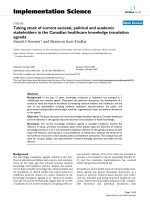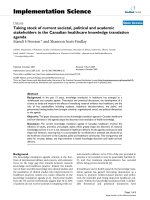Tentative Agenda Packet HealthCare Kata October 27_9.6.17_VS
Bạn đang xem bản rút gọn của tài liệu. Xem và tải ngay bản đầy đủ của tài liệu tại đây (918.19 KB, 8 trang )
Michigan Lean Consortium, Mercy Health
Muskegon and Mercy Health St. Mary’s presents
Healthcare Kata
Location:
1700 Clinton St., Muskegon, MI 49442 (Refer to Parking Map)
October 27, 2017
2017 Michigan Lean Consortium and Mercy Health Healthcare Kata Event
Agenda 8:30 AM – 4:15 PM
Time
Topic
8:30 – 9:15 AM
Registration and Welcome Period with Continental
Breakfast
9:15 – 9:25 AM
Welcome, Logistics and MLC Overview
9:25 – 9:45 AM
Mercy Health Welcome and Mercy Health Kata Journey
9:45 – 10:30 AM
Kata in Anatomic Pathology and Cytology with Q&A
Jessica Reasma
10:30 – 10:45 AM
Break
10:45 AM – 11:30
AM
Using Kata in Microbiology with Q&A Amna Seibold
11:30 – 12:15 PM
Mercy Muskegon Kata Pilot Project with Q&A Kelly
Gorbach
12:15 – 1:15 PM
Lunch
1:15 – 2:00 PM
Ortho Discharge with Q&A Carly Hundt, Jessica Rumler
and Jerry Browne
2:00 – 3:00 PM
Break out Session:
1. Kata Simulation Option or
2. Gemba Mock up in Classroom
3:00-4:00 PM
Panel Q&A
Panel: Robert Pease, Dennis Cutright, Maureen Stock,
Sarah Kolekemp, and Dorsey Sherman
4:00 – 4:15 PM
Event Feedback and WRAP UP
Location
Presentations and Speaker Introductions
Kata in Anatomic
Pathology and
Cytology
Presenter: Jessica Reamsma
Jessica Reamsma has been the Manager of Laboratory Services,
Anatomic Pathology and Cytology, at Mercy Health Saint Mary's in
Grand Rapids for 3 years. Previous to her role as Manager,
Jessica was the Pathology Technical Specialist in the Anatomic
Pathology area for 5 years. Jessica also has a BS in Health
Sciences from Grand Valley State University and is ASCP certified
as an HTL. Jessica has been using LEAN processes to guide her
team through experiments and KATA cycles to improve daily
workflow and eliminate wasted steps to create a better working
environment since it was brought into the Laboratory at Mercy
Health Saint Mary's 5 years ago.
SUMMARY
The presentation will include how the Anatomic Pathology and Cytology departments at Mercy Health
St. Mary's developed challenges, target conditions, obstacle parking lots, and PDCA cycles to
improve "Specimen Retrieval to Result Turnaround Time". Areas of interest are:
• How each challenge was developed and how it ties into the organizational strategy
• Best practices to tie targets, obstacle parking lots, and PDCA cycles back to the challenge
• Developing a challenge encompassing all areas of Anatomic Pathology and Cytology, as well as
individual challenges for each area
• Using specific tools to track Kata learner progress including the verification process to become a
Certified Learner
• How to keep colleagues engaged in the experiments when time and resources are limited
Using Kata in
Presenter: Amna Seibold
Amna Seibold has been the administrative director for the
Microbiology
Department of Pathology at Mercy Health Saint Mary's in Grand
Rapids since 1995. In the last 5 years, she has enjoyed working
with LEAN methodology for process improvement, as well as using
a LEAN management system for annual departmental strategy.
Amna has a BA from Albion College and an MHSA from the
University of Michigan. She is a graduate of the Michigan Political
Leadership Fellowship Program at Michigan State University.
Twice she has been selected as one of the 50 most influential
women in West Michigan.Amna is the mayor of East Grand
Rapids, and sits on several boards, including Ferris State
University Board of Trustees, and on the board of the RAPID
transit authority in Grand Rapids. Her LEAN knowledge is a
source of guidance for her in all of these arenas.
SUMMARY
1. Pitfalls:
• We were "looking for something to work on in order to give Microbiology department LEAN
experience." Consequently, staff was not engaged because front line staff did not choose the
improvement.
• Challenge was not properly defined. So, we ended up creating ineffective Challenge Statements that
did not adequately clarify our work, and we foundered.
2. Success
• After a few fitful starts, we wiped the slate clean, started over using stricter Kata rules.
• An experienced Px leader advised us.
• We used an experienced Kata coach who had been developed in a different area of the lab. She
understood the difficulties a beginner group faces. We used pure Kata guidelines to create a
meaningful Challenge Statement. I will describe common struggles of new teams and how Kata
coach combated these.
• We chose to work on the Inventory & Ordering process. It was helpful to observe Inventory KanBan
from another area of the lab, and springboard off of these learnings
• As of mid-August, there is good buy-in, a Kanban has been developed, and we are implementing a
new process ordering from bar code scanners. My presentation will describe and show visually what
is being accomplished.
• When this new ordering process is stabilized, we plan to roll it out to the rest of this department and
then spread it through the other areas of the lab.
Mercy Muskegon Kata
Pilot Project
Presenter: Kelly Gorbach
Kelly is a Senior Process Excellence Consultant with Mercy
Health-Muskegon Process Excellence Department. She has
worked for Mercy Health for a total of 7 1/2 years since graduating
from Ferris State University with her Bachelor's Degree in
Healthcare Systems Administration. The last 5 years of her career
at Mercy Health has been dedicated to Process Improvement. She
first found her passion for this work while working in the ambulatory
care setting. She was excited to join as a member of the Process
Excellence Team at the beginning of the Department's
development. This provided opportunity to work on a broader
array of services, including 3P work for the 10 story tower addition
to Mercy Campus' location.
SUMMARY
As Mercy Health-Muskegon started our Kata Pilot in January of 2017, we knew it was imperative to
understand the proficiency of those involved. The pilot included our Chief Nursing Officer, 3 Nursing
Directors, 13 nursing managers, and 5 Process Excellence Consultants. Thanks to the "Improvement
Kata and Coaching Kata Practice Guide" by Mike Rother, we knew it was important to track both
Improvement Kata proficiency of the Learner and Coaching Kata proficiency of the Coach. Since the
start of our pilot, we have had a few versions of proficiency scales in which we expected certain
outcomes, discovered what actually happened, and created revisions from what we learned. I would
like to tell the story of how our learnings of each of these versions lead us to our current. It was
created on the basis of ensuring the learner, coach, and 2nd coach is proficient according to the
specific responsibilities of their roles:
The Learner is responsible for the target condition and using the Improvement Kata to achieve it.
The Coach is responsible for teaching the improvement Kata, and for the Learner's Results.
The 2nd Coach is responsible for the effectiveness of the Coach's teaching.
The scale starts with assessing the Learner's proficiency within the Improvement Kata, then the
coach's teaching to any of the learner's identified gaps, then the 2nd coach's teaching to the coach of
any remaining gaps.
Ortho Discharge
Presenters: Carly Hundt
Co-Presenters: Jessalyn Rumler (Physical Therapist) and
Jerry Browne (Process Redesign Specialist)
Carly graduated from MSU with a BSN in nursing. Carly has
experience as an oncology and orthopedics nurse. She is Med
Surg certified and has training in nurse education. Carly has been
in leadership positions for the last 3 years.
SUMMARY
The kata coach Jerry Browne and kata learners Carly Hundt and Jessalyn Rumler will share our case study of the
successes and challenges of our first improvement kata project at Sparrow. We will discuss some of the successes and
challenges that we have faced and that we continue to face in using improvement kata. The specific challenge condition
that we are working on is the discharge of all of our total joint (hip and knee) patients and room turn around by noon on
surgical day 1. Some of the successes and challenges we will share are bulleted below.
Successes:
•
Organization of our improvement efforts
•
Focus on real obstacles rather than perceived
•
Reduce time of first discharge from an average of 2pm to an average of 11am
•
30% of target patients discharged by 12pm
•
Improved flow of patients from PACU to inpatient floor
•
Engagement of direct patient caregivers
•
Questioning the status quo of existing processes
•
Developed Team ownership
•
Focus on obstacles within our control
Challenges:
•
Developing long term buy-in from support areas
•
Development of standard work after successful experiments
•
Sustainment of standard work
•
Defining measurable experiment expectations
•
Consistent attendance from support team
•
Daily metric from bed clean is not easy to obtain
Target Audience:
Intermediate- participants will need basic knowledge of Lean to fully participate in discussion.
Parking/Driving Directions
HOTELS NEARBY
Holiday Inn Muskegon Harbor
939 Third Street
Muskegon, MI 49440
877-410-6667 (reservations)
231-722-0100 (front desk)
Hampton Inn Muskegon
1401 East Ellis Road
Muskegon, MI 49444
231-799-8333
Shoreline Inn & Conference Center
750 Terrace Point Road
Muskegon, MI 49440
231-720-4209









